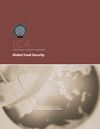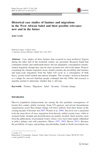-
The U.S. Intelligence Community’s Assessment on Food Security, Famine and Migration in the Sahel
January 26, 2016 By Gracie Cook This fall, the National Intelligence Council released an intelligence community assessment of the extent to which factors such as climate change, severe weather, conflict, resource scarcity, disease, poor governance, and environmental degradation will impact peoples’ purchasing power and food availability over the next decade. They found “the overall risk of food insecurity in many countries of strategic importance to the United States will increase.” Countries in the Middle East, Africa, Latin America, and South Asia are most vulnerable to food insecurity due to a combination of these factors. They assessed the potential benefits of an amalgam of educational, technological, and modern agricultural approaches to prevent food insecurity. Considering the importance of these high-risk countries and the United States’ position as a “leader in promoting global food security,” the United States should expect more demand for help and may find new strategic opportunities through such leadership.
This fall, the National Intelligence Council released an intelligence community assessment of the extent to which factors such as climate change, severe weather, conflict, resource scarcity, disease, poor governance, and environmental degradation will impact peoples’ purchasing power and food availability over the next decade. They found “the overall risk of food insecurity in many countries of strategic importance to the United States will increase.” Countries in the Middle East, Africa, Latin America, and South Asia are most vulnerable to food insecurity due to a combination of these factors. They assessed the potential benefits of an amalgam of educational, technological, and modern agricultural approaches to prevent food insecurity. Considering the importance of these high-risk countries and the United States’ position as a “leader in promoting global food security,” the United States should expect more demand for help and may find new strategic opportunities through such leadership. In order to better understand the patterns of famine and migration seen today in the West African Sahel and predict patterns of the future, John Grolle analyzes three case studies of famines that occurred in rural Nigeria in the late twentieth century in Population and Environment. These famines drove populations out of the Sahel and into the savannah in search of more suitable lands for farming and living, mainly in response to drought. As the effects of climate change pile up, meteorological phenomena are intensifying in both magnitude and frequency. Though traditional understandings of migration patterns out of the Sahel have focused on drought as the main catalyst, it is time for new attention to be paid to the impacts of heavy, untimely rainfall, Grolle says. Ultimately, he determines that in light of changing climate patterns, new research is needed to determine how regional migration will be affected by climate change and its subsequent effects.
In order to better understand the patterns of famine and migration seen today in the West African Sahel and predict patterns of the future, John Grolle analyzes three case studies of famines that occurred in rural Nigeria in the late twentieth century in Population and Environment. These famines drove populations out of the Sahel and into the savannah in search of more suitable lands for farming and living, mainly in response to drought. As the effects of climate change pile up, meteorological phenomena are intensifying in both magnitude and frequency. Though traditional understandings of migration patterns out of the Sahel have focused on drought as the main catalyst, it is time for new attention to be paid to the impacts of heavy, untimely rainfall, Grolle says. Ultimately, he determines that in light of changing climate patterns, new research is needed to determine how regional migration will be affected by climate change and its subsequent effects.Sources: National Intelligence Council, Population and Environment.
 A Publication of the Stimson Center.
A Publication of the Stimson Center.





